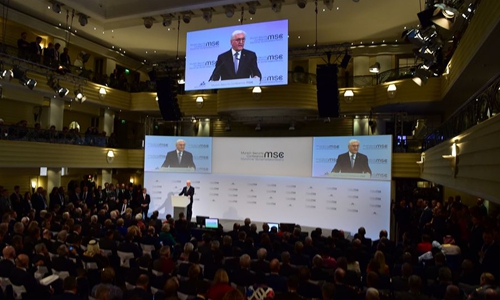HOME >> OPINION
Can the East save multilateralism amid US-EU disintegration?
By Song Wei Source:Global Times Published: 2020/2/18 17:33:41

German President Frank-Walter Steinmeier addresses the 56th Munich Security Conference (MSC) in Munich, Germany, on Feb. 14, 2020.Photo:Xinhua
While addressing the Munich Security Conference on Saturday, US Secretary of State Mike Pompeo said, "The West is winning." It was perhaps a response to this year's theme of the Munich Security Report 2020 - "Westlessness." But is it really?
On Friday, German President Frank-Walter Steinmeier said, "Our closest ally, the United States of America, under the present administration itself, rejects the idea of an international community," and added that it pursues greatness again, "even at the expense of neighbors and partners."
Over the past year, Western society's development reflected this idea. And although the Western alliance still remains, internal cracks have deepened. Western countries hold slim hope over implementing a joint strategy in the new era of major power competition.
One example is NATO, the core of US-EU relations. "What we are currently experiencing is the brain death of NATO," French President Emmanuel Macron told The Economist magazine last year. Macron's "brain death" theory exposed the divisions within NATO.
When the US reached an agreement with Turkey on military operations against Kurdish forces in northern Syria, the move placed the interests of US-European allies at stake while ignoring Europe's right to be informed.
From the perspective of European integration, after Brexit, the US-EU relationship without Britain will gradually weaken.
Economically, EU protectionism will grow, thus reducing the possibility of a comprehensive trade agreement between Washington and Brussels. As a result, economic competition and confrontation will further emerge.
In terms of defense, the EU has taken crucial steps toward integrating its defense industry, which will weaken defense ties between Europe and the US.
Since US President Donald Trump's administration adheres to "America First" and other unilateral policies, it has revealed an indifferent face toward its European allies.
The US has withdrawn from multiple international agreements, including the Joint Comprehensive Plan of Action with Iran, the Paris Agreement, and the Intermediate-Range Nuclear Forces (INF) Treaty with Russia. Such unilateralist behavior runs counter to the multilateral principles of US allies such as France and Germany.
Against the backdrop of Westlessness, the world would face a serious shortage of global security public goods and a fragile global security mechanism without support from the East.
Developing countries, including China, are exploring global governance solutions and proactively participating in the reform and construction of a worldwide governance system.
Amid regional hotspot issues and global challenges, China has courage in taking responsibility to promote resolutions. It has analyzed problems in a systematic manner, adhering to non-interference principles on the domestic affairs for other countries while opposing the use of force.
China's proposed solutions have stood the test of the time and have been met with approval by a growing number of countries.
In the face of Western governance malfunction, the China-proposed approaches to justice and interests, scientific outlook on development, a new vision for security featuring common, comprehensive, cooperative, and sustainable joint efforts, along with shared benefits and equal opportunities reflect the charm and wisdom of Eastern culture.
Such concepts have played a constructive role in promoting healthy development within the international community. They also possess a far-reaching strategic significance for global security and stability as well as building a community with a shared future for mankind.
The author is an associate research fellow at the Chinese Academy of International Trade and Economic Cooperation under the Ministry of Commerce. opinion@globaltimes.com.cn
Posted in: VIEWPOINT